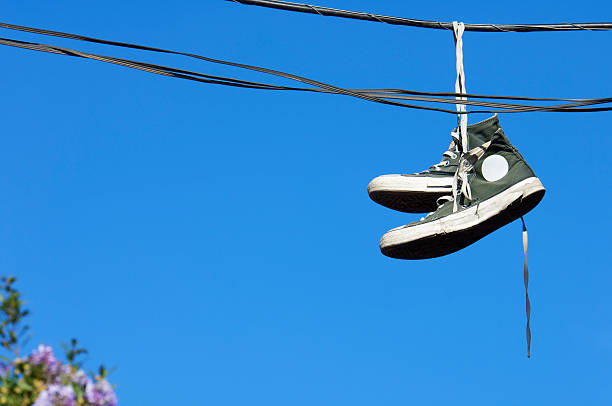If you’ve ever strolled through a city neighborhood or driven along a suburban road, chances are you’ve noticed a pair of shoes dangling from a power line. This peculiar sight has given rise to countless theories and urban legends, leaving many curious as to why anyone would toss their shoes up there. From symbolic gestures to acts of rebellion, this unusual practice holds diverse meanings and interpretations. Let’s delve into the fascinating reasons behind this urban mystery.
The Historical Roots of Hanging Shoes on Power Lines

The origin of hanging shoes on power lines is surprisingly elusive, with stories tracing it back to different eras and regions. One popular theory suggests that the practice began with soldiers during wartime, who tossed their boots over power lines to mark the end of their service. In this context, the act symbolized a major life transition, from the structure of military life to the freedom of civilian life.
Others believe that the phenomenon has its roots in gang culture, particularly in urban areas where shoes might signify territorial boundaries. Over time, this potential origin has blended with various interpretations, giving rise to a practice that now holds diverse meanings across communities worldwide.
Symbolic Interpretations and Cultural Significance
Hanging shoes on power lines is often more than just a random act—it can carry symbolic weight that varies across communities and individuals. In some cultures, it represents leaving the past behind and embracing a new chapter in life. Similar to shedding old memories, throwing shoes on a wire can signify a rite of passage, a farewell to a life stage, or a way to commemorate significant moments like graduation or moving away.
For others, shoes on a power line might symbolize loss, serving as a memorial for someone who has passed away. This silent tribute can provide a public yet personal reminder of a loved one, blending sorrow with reverence. Alternatively, the act may represent defiance or rebellion, as some view it as a way to make a bold statement in the urban environment, challenging norms or expressing frustration with societal structures.
Popular Theories Behind Shoes on Power Lines
The act of hanging shoes on power lines has generated several intriguing theories, each reflecting unique aspects of human behavior and urban culture. Here are some of the most widely believed explanations:
- Teenage Pranks and Rites of Passage: Many assume that teens, eager to leave their mark or celebrate milestones, hang shoes on power lines to commemorate events like finishing school. The act becomes a symbolic way to mark a transition into a new life phase, whether that means heading off to college, starting a job, or simply growing up.
- Gang Markers: In certain urban legends, shoes on power lines are rumored to be markers of gang territory. However, concrete evidence to support this theory is scarce, and while some communities may back this claim, it remains more of a myth than a substantiated fact.
- Signals for Drug Activity: Another persistent rumor is that hanging shoes indicate nearby drug activity, serving as a covert signal for those in the know. While this idea has circulated for years, there’s little solid evidence linking it directly to the drug trade, and it largely remains an urban legend.
These theories highlight how a single action can take on multiple meanings depending on context, location, and individual interpretation.
Urban Legends and Myths Surrounding Hanging Shoes
The sight of shoes on power lines has given rise to a host of urban legends, each one as captivating as the next. Among the most popular myths is the idea that the shoes serve as a memorial to someone who has passed away, left as a reminder of their presence in the community. Another tale suggests that hanging shoes indicate a form of rivalry or disrespect, a visible insult left for all to see.
These myths, passed down and retold over time, add layers of mystery to an already curious act. Shoes on power lines have, in many places, taken on a folklore-like quality, sparking curiosity and stirring the imagination of those who encounter them.
Safety Concerns: Why Authorities Don’t Take It Lightly

While hanging shoes may seem harmless, it poses real safety risks to the community. Power lines are designed to carry high-voltage electricity, and adding weight, especially multiple pairs of shoes, can strain and damage them. This damage can lead to power outages, blackouts, and even fires. When municipal workers have to remove shoes from power lines, they face significant risks, including potential exposure to high-voltage currents.
Public safety officials discourage the practice due to these dangers, and utility companies often educate the community about the costs and risks associated with shoe removal. In some places, hanging items on power lines is even classified as vandalism, leading to fines and penalties for those caught in the act.
Community Reactions: Art, Nuisance, or Cultural Symbol?
Community reactions to shoes on power lines vary widely. Some view it as a quirky form of street art or self-expression, seeing it as a playful addition to the urban landscape. For others, however, it’s a nuisance or an eyesore that disrupts the aesthetic of an otherwise orderly street. Some local advocacy groups even call for the removal of these shoes, arguing that they create a negative impression of the neighborhood.
Conversely, there are those who see the hanging shoes as a symbol of community identity, viewing them as part of the neighborhood’s unique character. To them, shoes on power lines represent the spirit and history of the area, blending art with memory and local pride.
How Authorities and Municipalities Respond to Shoe Hanging
In many cities, hanging objects on power lines is considered vandalism, and authorities take steps to prevent it. Fines and penalties can be imposed on those caught engaging in the act, as city officials aim to discourage this behavior for safety and public order reasons. Law enforcement agencies and utility companies often collaborate to remove hanging shoes and educate the community on the potential hazards associated with shoe-hanging practices.
Some cities have introduced outreach programs to inform residents, particularly young people, about the dangers of hanging shoes on power lines. Through these efforts, municipalities hope to protect the community’s safety while preserving the integrity of essential infrastructure.
Conclusion: Layers of Meaning in Shoes on Power Lines
The practice of hanging shoes on power lines is a fascinating example of how simple actions can evolve into complex cultural expressions. From symbolic gestures of change and growth to mysterious signals or expressions of rebellion, the act of throwing shoes onto power lines has woven itself into urban life, each pair carrying its own story.
The next time you see a pair of shoes swaying in the breeze above a power line, consider the many meanings it might hold. Whether it’s a rite of passage, a quiet tribute, or a reflection of urban myth, shoes on power lines remind us of the hidden layers within our cities. This simple act, repeated across neighborhoods, transforms an ordinary sight into a conversation starter, capturing the intrigue and mystery of human behavior in our modern landscape.


